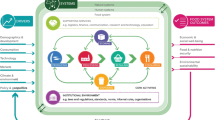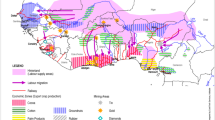Abstract
Access to seed is crucial for farming, though few studies investigate household-level access in the informal ‘farmer seed systems’ which still supply most seed in poor countries. This paper uses empirical data of seed exchange practices for sorghum in eastern Ethiopia to analyze how social relationships influence access to off-farm seed for a major crop. Seed shortfalls are common, and farmer–farmer exchange is important for providing locally-adapted seed to fill this gap, but access varies considerably among households, also affecting quantities supplied and terms of exchange. Preferred sources for off-farm seed (neighbors, government, market) also vary among farmers, reflecting agroecology and asset-ownership, but also differing access to these sources. Social network theories highlight the importance of reciprocal ties, and the cultural norms underpinning them, in accessing seed. These cultural norms are contested, with some claiming that commercial transactions are increasingly common. Implications for interventions supporting farmer seed systems, particularly emergency seed aid, are discussed in relation to the socially-mediated nature of seed access.
Similar content being viewed by others
Notes
For instance, the FAO supported seed system development projects 60 countries, while the World Bank spent US $80 million on seed supply reforms in 40 sub-Saharan African countries (Scowcroft and Polack Scowcroft 1999).
References
Adams, A. (1993). Food Insecurity in Mali: Exploring the Role of the Moral Economy. IDS Bulletin 24:41–51.
Agrawal, A. (2003). Sustainable Governance of Common-pool Resources: Context, Methods, and Politics. Annual Review of Anthropology 32:243–262.
Almekinders, C. J. M., and Louwaars, N. P. (1999). Farmers’ Seed Production: New Approaches and Practices, Intermediate Technology Publications, London.
Badstue, L. B. (2006). Smallholder Seed Practices: Maize Seed Management in the Central Valleys of Oaxaca, Mexico, Unpublished PhD, Wageningen University, Wageningen.
Badstue, L. B., Bellon, M. R., Berthaud, J., Juárez, X., Manual Rosas, I., Solano, A. M., and Ramírez, A. (2006). Examining the Role of Collective Action in an Informal Seed System: A Case Study from the Central Valleys of Oaxaca, Mexico. Human Ecology 34: 249–273.
Bailey, C. (1991). Class Differentiation and Erosion of a Moral Economy in Rural Malaysia. Research in Economic Anthropology 13: 119–142.
Bassi, M. (1994). Gada as an integrative factor of political organization. In Brokensha, D. (ed.), A River of Blessings: Essays in Honor of Paul Baxter, Syracuse University, Syracuse, pp. 15–30.
Bellon, M. R. (1996). The Dynamics of Crop Infraspecific Diversity: A Conceptual Framework at the Farmer Level. Economic Botany 50: 26–39.
Bellon, M. R. (2004). Conceptualizing Interventions to Support On-farm Genetic Resource Conservation. World Development 32: 159–172.
Berry, S. (1989). Social Institutions and Access to Resources. Africa 59: 41–55.
Berry, S. (1992). Hegemony on a Shoestring: Indirect Rule and Access to Agricultural Land. Africa 62: 327–355.
Berry, S. (1993). No Condition is Permanent: The Social Dynamics of Agrarian Change in Sub-Saharan Africa, University of Wisconsin Press, Madison, WI.
Blackhurst, H. (1978). Continuity and change in the Shoa Galla Gada system. In Baxter, P. T. W., and Almagor, U. (eds.), Age, Generation, and Time: Some Features of East African Age Organisations, C. Hurst and Co., London, pp. 245–267.
Blackhurst, H. (1996). Adopting an ambiguous position: Oromo relationships with strangers. In Baxter, P. T. W., Hultin, J., and Triulzi, A. (eds.), Being and Becoming Oromo: Historical and Anthropological Enquiries, Nordiska Afrikainstitutet, Uppsala, pp. 239–250.
Bramel, P., Nagoda, S., Haugen, J., Adugna, D., Dejene, T., Bekele, T., and Trædal, L. T. (2004). Relief seed assistance in Ethiopia. In Sperling, L., Remington, T., Haugen, J., and Nagoda, S. (eds.), Addressing Seed Security in Disaster Response: Linking Relief with Development, CIAT, Cali, Colombia, pp. 111–133.
Brosius, J. P. (1997). Endangered Forest, Endangered People: Environmentalist Representations of Indigenous Knowledge. Human Ecology 25: 47–69.
Bulcha, M. (1996). The survival and reconstruction of Oromo national identity. In Baxter, P. T. W., Hultin, J., and Triulzi, A. (eds.), Being and Becoming Oromo: Historical and Anthropological Enquiries, Nordiska Afrikainstitutet, Uppsala, pp. 48–66.
Cleveland, D. A., and Murray, S. C. (1997). The World’s Crop Genetic Resources and the Rights of Indigenous Farmers. Current Anthropology 38: 477–515.
Cleveland, D. A., and Soleri, D. (eds.) (2002). Farmers, Scientists and Plant Breeding: Integrating Knowledge and Practice, CABI, Wallingford, UK.
Cooke, B., and Kothari, U. (eds.) (2001). Participation: The New Tyranny?, Zed, London.
Cromwell, E. (1996). Governments, Farmers, and Seeds in a Changing Africa, CABI, Wallingford, UK.
David, S., and Sperling, L. (1999). Improving Technology Delivery Mechanisms: Lessons from Bean Seed Systems Research in Eastern and Central Africa. Agriculture and Human Values 16: 381–388.
Dhamotharan, M., Weltzien, E., Whitaker, M. L., Rattunde, H. F. W., Anders, M. M., Tyagi, M. C., Manga, V. K., and Vyas, K. L. (1997). Seed management strategies of farmers in Western Rajasthan in their social and environmental contexts: results from a workshop using new communication techniques for a dialog between farmers and scientists, Integrated Systems Project Support Report 9, ICRISAT, Patancheru, Andra-Pradesh.
Dirks, R. (1980). Social Responses During Severe Food Shortages and Famine. Current Anthropology 21: 21–44.
Goe, M. R. (1999). Influence of Slope and Stone Cover on Tillage Operations in the Ethiopian Highlands. Soil and Tillage Research 49: 289–300.
Haggis, J., Jarrett, S., Taylor, D., and Mayer, P. (1986). By the Teeth: A Critical Examination of James Scott’s The Moral Economy of the Peasant. World Development 14: 1435–1455.
Hammond, L., and Maxwell, D. (2002). The Ethiopian Crisis of 1999–2000: Lessons Learned, Questions Unanswered. Disasters 26: 262–279.
Hyden, G. (1980). Beyond Ujamaa in Tanzania, University of California Press, Berkeley.
Hyden, G. (2006). African Politics in Comparative Perspective, Cambridge University Press, Cambridge.
ICRA (1996). Supporting agricultural innovation in two districts in Western Harerghe: the role of research, extension, and farmers, Working Document Series 52, International Centre for development oriented Research in Agriculture, Wageningen and Addis Abeba.
Jones, R. B., Bramel, P., Longley, C., and Remington, T. (2002). The Need to Look Beyond the Production and Provision of Relief Seed: Experiences from Southern Sudan. Disasters 26: 302–315.
Lewis, H. S. (1975). Neighbours, Friends, Kinsmen: Principles of Social Organisation Among Cushitic-speaking Peoples of Ethiopia. Proceedings of First United States Conference on Ethiopian Studies, Africa Studies Centre, Michigan State University, East Lansing, Michigan, pp. 193–207.
Louette, D., Charrier, A., and Berthaud, J. (1997). In Situ Conservation of Maize in Mexico: Genetic Diversity and Maize Seed Management in a Traditional Community. Economic Botany 51: 20–38.
Mburathi, G. K., Bultman, C., Matenge, F., and Ibrahim, O. (2003). Rethinking seed relief interventions: an Ethiopian case study. In Sperling, L., Osborn, T., and Cooper, D. (eds.), Towards Effective and Sustainable Seed Relief Activities, FAO, Rome, pp. 54–65.
McCann, J. C. (1995). People of the Plow: An Agricultural History of Ethiopia. 1800–1990, University of Wisconsin Press, Madison.
McGuire, S. J. (2005). Getting Genes: Rethinking Seed System Analysis and Reform for Sorghum in Ethiopia, Unpublished PhD, Wageningen University, Wageningen, the Netherlands.
McGuire, S. J. (2007). Vulnerability in Farmer Seed Systems: Farmer Practices for Coping with Seed Insecurity for Sorghum in Eastern Ethiopia. Economic Botany 63: 211–222.
McGuire, S. J., Manicad, G., and Sperling, L. (1999). Technical and institutional issues in participatory plant breeding—done from a perspective of farmer plant breeding: a global analysis of issues and of current experience, CGIAR Systemwide Program on Participatory Research and Gender Analysis, PPB Monograph 2, CIAT, Cali, Colombia.
Piguet, F. (2003). Hararghe and Shinille Zone Food Security Assessment, Assessment Report, UN-Emergencies Unit for Ethiopia/OCHA, Addis Abeba.
Popkin, S. L. (1979). The Rational Peasant: The Political Economy of Rural Society in Vietnam, University of California Press, Berkley.
Pratten, D. T. (1997). Local Institutional Development and Relief in Ethiopia: A kire-based Seed Distribution Programme in North Wollo. Disasters 21: 138–154.
Rahmato, D. (1985). Agrarian Reform in Ethiopia, Red Sea Press, Trenton, New Jersey.
Remington, T., Maroko, J., Walsh, S., Omanga, P., and Charles, E. (2002). Getting off the Seeds-and-Tools Treadmill with CRS Seed Vouchers and Fairs. Disasters 26: 316–328.
Richards, P. (1986). Coping with Hunger: Hazard and Experiment in an African Rice Farming System, Allen and Unwin, London.
Richards, P. (1990). Local Strategies for Coping with Hunger: Central Sierra Leone and Northern Nigeria Compared. African Affairs 89: 265–275.
Richards, P., Ruivenkamp, G., van der Drift, R., Gonowolo, M., Jusu, M. S., Longley, C., and McGuire, S. J. (1997). Seed and Survival: Crop Genetic Resources in War and Reconstruction in Africa, International Plant Genetic Resources Institute, Rome.
Scott, J. C. (1976). The Moral Economy of the Peasant: Rebellion and Subsistence in Southeast Asia, Yale University Press, New Haven.
Scott, J. C. (1985). Weapons of the Weak: Everyday Forms of Peasant Resistance, Yale University Press, New Haven.
Scowcroft, W. R., and Polack Scowcroft, C. E. (1999). Developing a strategy for sustainable seed supply systems in sub-Saharan Africa: Policies, Stakeholders and coordination. Seed policy and programmes for sub-Saharan Africa. Proceedings of the Regional Technical Meeting on Seed Policy and Programmes for sub-Saharan Africa. FAO Plant Production and Protection Paper No. 151, Rome: FAO, Abidjan, Côte d’Ivoire, pp. 175–190.
Sharp, K., and Devereux, S. (2004). Destitution in Wollo (Ethiopia): Chronic Poverty as a Crisis of Household and Community Livelihoods. Journal of Human Development 5: 227–247.
Sperling, L. (1997). War and Crop Diversity, ODI AgREN Network Paper 75, Overseas Development Institute, London.
Sperling, L., and Cooper, D. (2003). Understanding seed systems and strengthening seed security. In Sperling, L., Osborn, T., and Cooper, D. (eds.), Towards Effective and Sustainable Seed Relief activities, FAO. Plant Production and Protection Paper 181, Rome, pp. 7–33.
Sperling, L., and Loevinsohn, M. (1993). The Dynamics of Adoption: Distribution and Mortality of Bean Varieties Among Small Farmers in Rwanda. Agricultural Systems 41: 441–453.
Sperling, L., Osborn, T., and Cooper, D. (eds.) (2003). Towards Effective and Sustainable Seed Relief Activities, FAO. Plant Production and Protection Paper 181, Rome.
Sperling, L., Remington, T., Haugen, J., and Nagoda, S. (eds.) (2004). Addressing Seed Security in Disaster Response: Linking Relief with Development, International Center for Tropical Agriculture, Cali.
Sperling, L., Remington, T., and Haugen, J. (2006). Seed Aid for Seed Security: Advice for Practitioners, Practice Briefs 1–10, International Center for Tropical Agriculture and Catholic Relief Services, Rome.
Ta’a, T. (1996). Traditional and modern cooperatives among the Oromo. In Baxter, P. T. W., Hultin, J., and Triulzi, A. (eds.), Being and Becoming Oromo: Historical and Anthropological Enquiries, Nordiska Afrikainstitutet, Uppsala, pp. 202–209.
Tesfaye, M. (1961). Mutual-aid Associations Among the Kottu-Galla of Harer. Ethnological Society Bulletin, University of Addis Abeba 2: 71–80.
Teshome, A., Fahrig, L., Torrance, J. K., Lambert, J. D., Arnason, J. T., and Baum, B. R. (1999). Maintenance of Sorghum (Sorghum bicolor, Poaceae) Landrace Diversity by Farmers’ Selection in Ethiopia. Economic Botany 53: 79–88.
Tripp, R. (2001). Seed Provision and Agricultural Development, Overseas Development Institute, London.
Watts, M. (1983). Silent Violence: Food, Famine and Peasantry In Northern Nigeria, University of California Press, Berkeley.
Wilbaux, H. (1986). Agriculture in the highlands of Harerghe, Kombolcha area. Study of six farms. Unpublished report., Department of Agricultural Economics, Alemaya University of Agriculture, and French Technical Co-operation, Alemaya, Ethiopia.
Acknowledgements
This study was made possible by research scholarships from Canada’s Natural Sciences and Engineering Research Council, and the O’Brien Foundation. The support of the Ethiopian Agricultural Research Organization, and of the Technology and Agrarian Development Research Group in Wageningen University is also appreciated. Incisive comments from Christine Okali, Cecile Jackson, and three anonymous reviewers are gratefully acknowledged.
Author information
Authors and Affiliations
Corresponding author
Rights and permissions
About this article
Cite this article
McGuire, S.J. Securing Access to Seed: Social Relations and Sorghum Seed Exchange in Eastern Ethiopia. Hum Ecol 36, 217–229 (2008). https://doi.org/10.1007/s10745-007-9143-4
Published:
Issue Date:
DOI: https://doi.org/10.1007/s10745-007-9143-4




